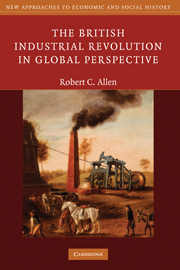Book contents
- Frontmatter
- Contents
- List of plates
- List of figures
- List of tables
- Acknowledgments
- 1 The Industrial Revolution and the pre-industrial economy
- Part I The pre-industrial economy
- 2 The high-wage economy of pre-industrial Britain
- 3 The agricultural revolution
- 4 The cheap energy economy
- 5 Why England succeeded
- Part II The Industrial Revolution
- References
- Index
5 - Why England succeeded
Published online by Cambridge University Press: 05 June 2014
- Frontmatter
- Contents
- List of plates
- List of figures
- List of tables
- Acknowledgments
- 1 The Industrial Revolution and the pre-industrial economy
- Part I The pre-industrial economy
- 2 The high-wage economy of pre-industrial Britain
- 3 The agricultural revolution
- 4 The cheap energy economy
- 5 Why England succeeded
- Part II The Industrial Revolution
- References
- Index
Summary
Philosophy is written in this grand book, the universe, which stands continually open to our gaze. But the Book cannot be understood unless one first learns to comprehend the language and read the characters in which it is written. It is written in the language of mathematics, and its characters are triangles, circles, and other geometric figures without which it is humanly impossible to understand a single word of it; without these one is wandering in a dark labyrinth.
Galileo Galilei, Il SaggiatoreThe British economy leaped forward after 1500: cities grew, London's wages were high, agriculture improved, and manufacturing spread across the countryside. The specifics of change suggest that cities and commerce were the responsible agents. High wages, for instance, were maintained in London in the sixteenth century while they were collapsing elsewhere; in the seventeenth century, the rest of the country began to catch up as provincial cities began to grow rapidly. London's growth unleashed the flood of northeastern coal as wood prices soared.
This chapter will develop the idea that the growth of the urban, commercial economy drove the English economy forward in the centuries before the Industrial Revolution. The matter is complicated by two issues. The first relates to ultimate causation. The growth of cities may have pushed the national economy forward, but what made the cities grow? I will shift the analysis back a stage by attributing city growth to other factors.
- Type
- Chapter
- Information
- The British Industrial Revolution in Global Perspective , pp. 106 - 132Publisher: Cambridge University PressPrint publication year: 2009



